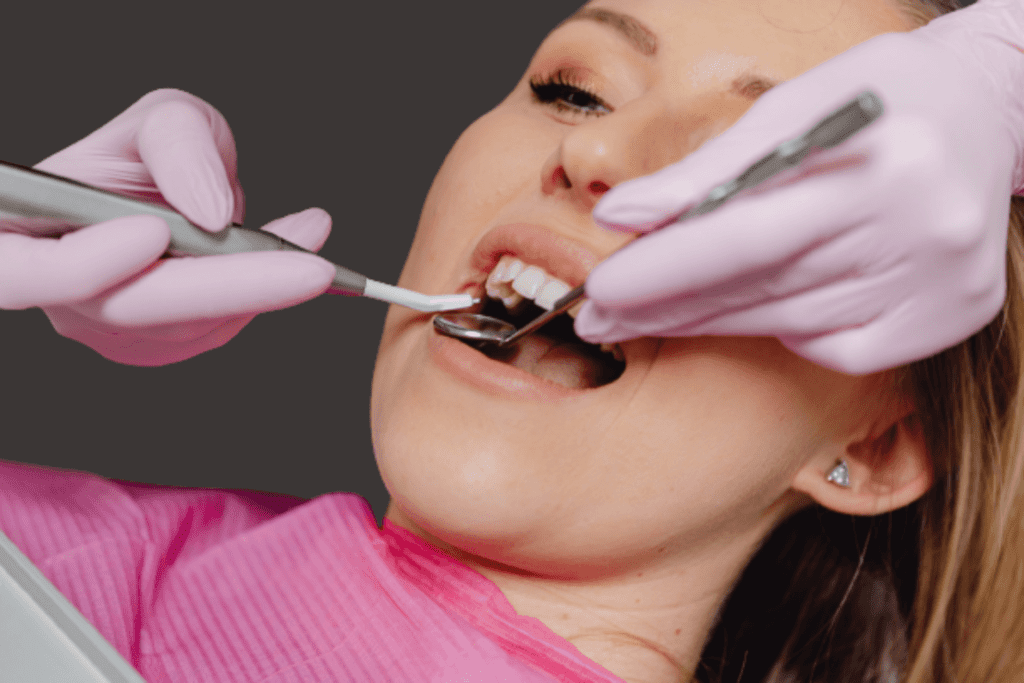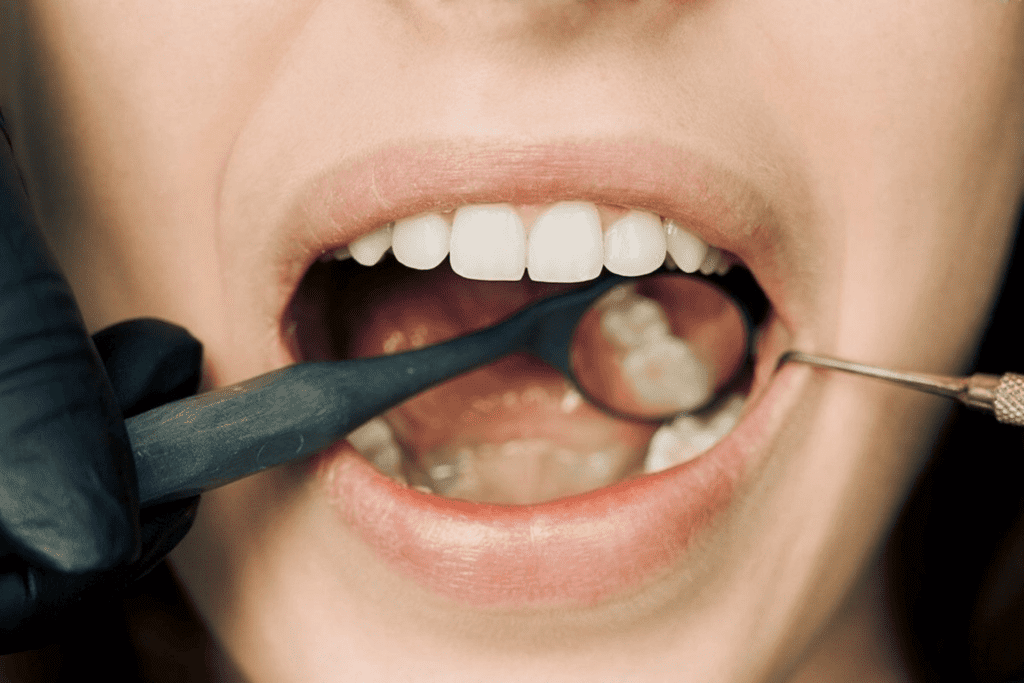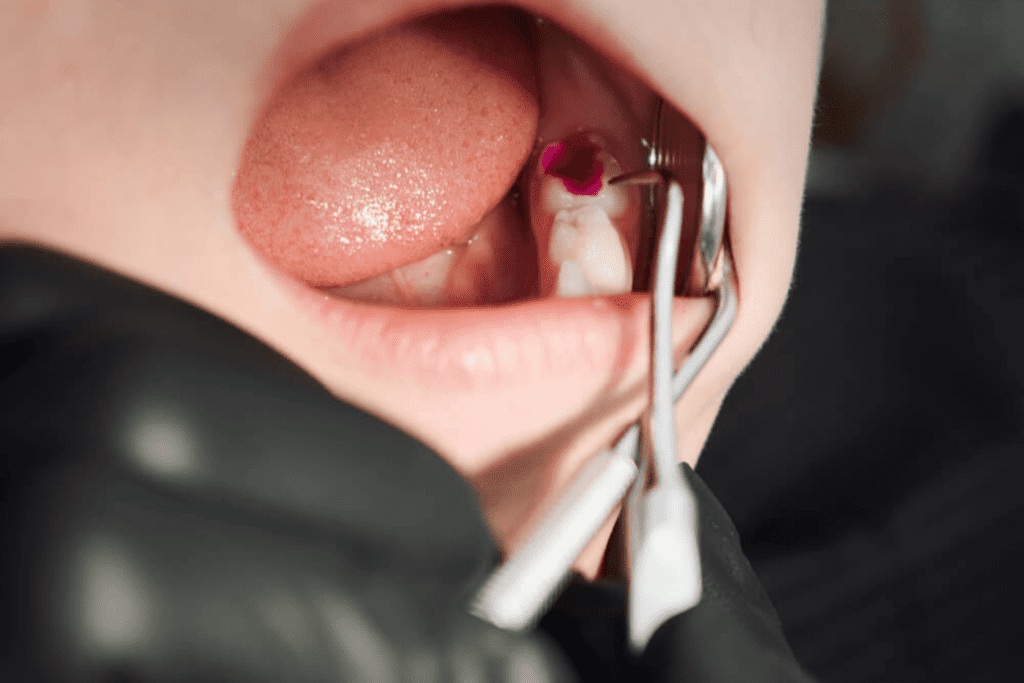We sometimes add products that we believe may be beneficial to our readers. We may receive a small commission if you purchase using the links on this page. Read our affiliate disclaimer

What is Bad Breath (Halitosis)?
Bad breath, also known as halitosis, is a condition characterized by an unpleasant odor originating from the mouth. It can result from a variety of factors, including poor oral hygiene, dental problems, dry mouth, certain foods, or underlying health issues. The foul smell is often caused by the breakdown of food particles by bacteria in the mouth, releasing sulfur compounds. halitosis can be embarrassing and negatively impact social interactions and self-confidence. However, with proper oral care, regular dental check-ups, and addressing any underlying issues, it is possible to manage and prevent bad breath, promoting fresh breath and overall oral health.
Table of Contents
ToggleWhat are the Symptoms of Halitosis?
The primary symptom of halitosis, or bad breath, is the presence of an unpleasant odor in the breath. This odor can vary in intensity and may persist or recur over an extended period. Individuals with halitosis may notice the following symptoms:
Foul-Smelling Breath
Halitosis is characterized by an unpleasant odor in the breath. The specific odor can vary depending on the underlying cause. It may be described as rotten, metallic, sour, or simply “bad.” The odor is often noticeable to others when the affected individual speaks or exhales.
Dry Mouth
A dry mouth, or xerostomia, is a condition characterized by reduced saliva production. Saliva plays a crucial role in maintaining oral health by lubricating the mouth, washing away food particles, and neutralizing acids produced by bacteria. When saliva production is decreased, the mouth becomes dry, creating an environment where bacteria can thrive and produce malodorous compounds.
Unpleasant Taste
Along with halitosis, individuals with halitosis may experience a persistent unpleasant or metallic taste in their mouth. This taste can be caused by the accumulation of bacteria, food particles, or metabolic byproducts that contribute to the foul odor.
The Coating On The Tongue
A tongue coating or tongue plaque refers to a visible layer or discoloration on the surface of the tongue. It can vary in color from white to yellowish or even brownish. The coating is often caused by the accumulation of bacteria, dead cells, food debris, and other organic matter on the tongue’s surface. This coating can contribute to the production of unpleasant odors.
Postnasal Drip
Postnasal drip is the result of an overflow of mucus from the nasal passages and sinuses that trickles down the throat. This condition can be triggered by allergies, sinus infections, or various respiratory ailments. The presence of excess mucus provides a breeding ground for bacteria, and when combined with saliva and food remnants, it can give rise to unpleasant breath odors, contributing to halitosis
Thick Saliva
In some cases of halitosis, individuals may notice that their saliva feels thicker or stringy. This can be a result of dehydration, reduced saliva flow, or certain medications. The thicker saliva can contribute to the accumulation of bacteria and oral debris, leading to halitosis.
What is the Primary Underlying Factor Responsible for Bad Breath?

Poor oral hygiene stands as the leading cause of halitosis. When proper oral hygiene practices are not followed, bacteria can accumulate in the mouth, leading to the production of foul-smelling compounds. This buildup of bacteria and the resulting odor can affect the breath.
Other common causes of halitosis include:
Poor Oral Hygiene
When oral hygiene practices are inadequate, bacteria in the mouth can multiply and form a sticky film called plaque. Plaque buildup on the teeth and along the gum line can release volatile sulfur compounds (VSCs), which have a foul odor. Neglecting to brush teeth at least twice a day, skipping flossing, or not cleaning the tongue allows bacteria to thrive, leading to bad breath.
Food and Drink
Certain foods and beverages contain compounds that, when digested, are carried through the bloodstream to the lungs, affecting the breath. Foods like onions, garlic, spices, and strong cheeses contain sulfur compounds that can be released during digestion and expelled through breath. Additionally, beverages like coffee and alcohol can leave a lingering smell in the mouth, contributing to halitosis.
Tobacco Use
Smoking or using tobacco products not only leaves a distinct odor in the mouth but also affects oral health. Tobacco use can cause gum disease, which leads to the buildup of plaque and bacteria, resulting in bad breath. Moreover, smoking dries out the mouth and reduces saliva flow, further contributing to foul-smelling breath.
Dry Mouth
Saliva helps cleanse the mouth by washing away food particles and neutralizing acids produced by bacteria. When there is reduced saliva flow or xerostomia, it creates an environment where bacteria can thrive. A dry mouth can be caused by factors such as dehydration, certain medications, breathing through the mouth, and underlying health conditions. With less saliva to wash away bacteria and food debris, bad breath can develop.
Dental Issues
Tooth decay (cavities), gum disease (periodontitis), oral infections, and poorly fitted dental appliances can contribute to halitosis. In tooth decay, bacteria break down the tooth structure, leading to a foul odor. Gum disease causes inflammation and the release of odor-causing substances. Oral infections, such as abscesses, can produce a putrid smell. Ill-fitting dental appliances, like dentures or braces, can trap food particles and bacteria, leading to bad breath.
What are Other Halitosis Causes?
In addition to the common causes mentioned earlier, other factors can contribute to halitosis. These include:
Systemic Conditions
Certain systemic health conditions can lead to chronic bad breath. These conditions include respiratory infections like sinusitis, bronchitis, or postnasal drip. Additionally, gastrointestinal disorders like acid reflux (GERD), chronic gastritis, or bowel obstruction can also cause foul-smelling breath. Liver or kidney problems, as well as diabetes, can contribute to the production of odorous compounds that affect breath.
Medications
Some medications can cause dry mouth as a side effect, which in turn can contribute to halitosis. Medications used to treat allergies, depression, anxiety, high blood pressure, and some antihistamines can reduce saliva flow, leading to a dry mouth environment that allows bacteria to thrive.
Mouth Breathing
Breathing primarily through the mouth instead of the nose can lead to a dry mouth and contribute to halitosis. This is commonly seen in individuals with chronic nasal congestion, deviated septum, or sleep apnea. Mouth breathing reduces saliva production, allowing bacteria to flourish and causing halitosis.
Dieting and Fasting
Rapid weight loss programs or prolonged fasting can cause the body to break down fat for energy, resulting in the release of ketones. Ketones have a strong and distinctive odor, which can contribute to bad breath.
Hormonal Changes
Hormonal changes during puberty, menstruation, pregnancy, and menopause can affect the body’s chemistry and lead to an increase in volatile compounds, resulting in bad breath.
Stress and Anxiety
Stress and anxiety can lead to dry mouth and reduced saliva flow. Additionally, individuals may engage in habits like teeth grinding or irregular eating patterns, which can contribute to halitosis.
Oral Appliances
Wearing oral appliances like retainers, braces, or mouth guards can create areas where bacteria can accumulate and cause bad breath. It is important to clean these appliances regularly to prevent odor-causing bacteria growth.
Identifying and addressing these additional causes of halitosis may require consultation with a dental professional or healthcare provider. They can provide a comprehensive evaluation and recommend appropriate treatment options to manage halitosis effectively.
Rarer Causes of Bad Breath

While less common, there are several rarer causes of bad breath, or halitosis, that should be considered if persistent or severe symptoms are present. These include:
Tonsil Stones (Tonsilloliths)
Tonsil stones are calcified deposits that form in the crevices of the tonsils. They are composed of bacteria, food particles, and debris that accumulate and harden over time. Tonsil stones can release a foul odor, contributing to halitosis. Removal of tonsil stones may be necessary to alleviate the problem.
Oral Cancers
In rare cases, certain oral cancers or tumors can cause halitosis. These malignancies can release gases or odorous substances that result in persistent bad breath. If halitosis is accompanied by other concerning symptoms like persistent mouth sores, difficulty swallowing, or unexplained weight loss, a dental or medical professional should be consulted for further evaluation.
Respiratory Tract Infections
While common respiratory infections like sinusitis and bronchitis can cause bad breath, certain less common infections, such as lung abscesses or tuberculosis, can also contribute to foul-smelling breath. These infections can release odor-producing compounds, resulting in halitosis.
Metabolic Disorders
Some metabolic disorders, such as trimethylaminuria (also known as “fish odor syndrome”), can cause individuals to emit a strong and distinct odor, resembling rotting fish. This condition is due to the body’s inability to break down certain compounds properly. While halitosis may not be the sole symptom of these disorders, it can be present along with other systemic manifestations.
Gastrointestinal Disorders
Rare gastrointestinal conditions like H. pylori infection, gastric ulcers, or malabsorption disorders can lead to chronic bad breath. These conditions can disrupt the normal digestive process, resulting in the release of odorous gases or substances that affect breath.
Types of Bad Breath Smell
There are different types of bad breath smells that can indicate underlying causes. Here are some common types:
Sulphuric or Rotten Egg Smell
This type of bad breath odor is often associated with the presence of volatile sulfur compounds (VSCs) in the mouth. These compounds are produced by anaerobic bacteria that reside in dental plaque, food particles, or debris in the mouth. When these bacteria break down proteins, they release VSCs, resulting in a foul odor reminiscent of rotten eggs.
Fruity or Sweet Smell
A fruity or sweet odor in the breath can be a sign of uncontrolled diabetes or diabetic ketoacidosis. When blood sugar levels are high, the body may enter a state where it starts breaking down fats for energy instead of glucose. This process, called ketosis, leads to the production of ketones, which can have a sweet or fruity smell. The breath may resemble the scent of acetone or overripe fruit.
Ammonia-Like Smell
An ammonia-like odor in the breath can indicate kidney problems, such as kidney failure or chronic kidney disease. When the kidneys are not functioning properly, they may not be able to efficiently filter waste products from the blood, including urea. As a result, urea can accumulate in the body and be excreted through the breath, giving it an ammonia-like smell.
Putrid or Decay-Like Smell
A putrid or decay-like odor in the breath can be associated with oral infections, such as tooth decay or gum disease. When bacteria proliferate and break down the tissues in the mouth, they release volatile compounds that contribute to this unpleasant smell. The breakdown of proteins and the presence of necrotic tissue can intensify the putrid odor.
Metallic or Bleach-Like Smell
A metallic or bleach-like smell in the breath can be linked to certain respiratory infections. Sinusitis, bronchitis, or lung abscesses can cause the release of bacteria or infected mucus into the respiratory tract. The presence of these infectious agents can produce volatile compounds with a metallic or bleach-like odor.
Acetone or Nail Polish Remover Smell
An acetone or nail polish remover-like smell in the breath is associated with ketosis. When the body breaks down fats for energy instead of carbohydrates, it produces ketones as a byproduct. Ketones, such as acetone, can be detected in the breath and give it a distinct odor similar to nail polish remover.
What Health Problems Are Associated With Bad Breath?

Bad breath, or halitosis, can sometimes be an indication of underlying health problems. While most cases of halitosis are related to oral hygiene and factors within the mouth, certain health conditions can contribute to or be associated with bad breath.
Here are some health problems that may be associated with halitosis:
Gum Disease (Periodontal Disease)
Persistent bad breath can be a symptom of gum disease. Gum disease is caused by bacteria that accumulate in the mouth, leading to inflammation and infection of the gums. The bacteria release foul-smelling gases, contributing to halitosis.
Dental Issues
Cavities, tooth decay, and dental infections can produce an unpleasant odor. If left untreated, these conditions can contribute to halitosis. Additionally, oral appliances such as braces, dentures, or dental appliances that are not cleaned properly can also trap food particles and bacteria, leading to bad breath.
Dry Mouth (Xerostomia)
Insufficient saliva production or dry mouth can contribute to bad breath. Saliva helps cleanse the mouth by rinsing away bacteria and food particles. Certain medications, medical conditions, or lifestyle factors can cause dry mouth, including certain medications, salivary gland disorders, breathing through the mouth, and smoking.
Sinus and Respiratory Infections
Chronic sinus infections, postnasal drip, and other respiratory infections can cause halitosis. The presence of bacteria in the sinus or respiratory passages can produce foul-smelling breath.
Tonsil Stones
Tonsil stones, or tonsilloliths, are calcified deposits that form in the crevices of the tonsils. They are composed of bacteria, mucus, dead cells, and debris that accumulate over time. Tonsil stones can release an unpleasant odor, contributing to bad breath.
Gastrointestinal Conditions
Certain gastrointestinal conditions, such as acid reflux (gastroesophageal reflux disease or GERD) and gastritis, can cause halitosis. Stomach acids and gases that reflux into the mouth can produce an unpleasant odor. Additionally, conditions like intestinal obstruction or malabsorption disorders may also contribute to bad breath.
Diabetes
Uncontrolled diabetes or diabetic ketoacidosis can lead to a fruity or sweet-smelling breath. This is due to the presence of ketones, which are acidic byproducts of fat metabolism.
Liver and Kidney Disease
Severe liver disease or kidney disease can sometimes cause a distinct odor on the breath, often described as “fishy” or ammonia-like. This is due to the accumulation of toxins in the body that are not properly eliminated by these organs.
Respiratory Conditions
Chronic bronchitis, lung infections, and other respiratory conditions can cause persistent coughing and lead to halitosis.
Certain Cancers
In rare cases, certain types of cancers, such as oral, throat, or lung cancer, can cause chronic bad breath. This is typically due to the breakdown of tissues or the presence of infections associated with the cancer.
How is Halitosis Treated?

The treatment of halitosis, or bad breath, depends on the underlying cause. Here are some common approaches to managing and treating halitosis:
Good Oral Hygiene
Good oral hygiene plays a pivotal role in the prevention and management of bad breath. To achieve this, it is recommended to brush teeth at least twice daily using fluoride toothpaste, as it effectively eliminates plaque, food particles, and bacteria from both the teeth and gums. Using a soft-bristled toothbrush and employing gentle, circular motions during brushing is advised.
Daily flossing is essential for cleaning the areas between teeth and along the gum line, which are inaccessible to a toothbrush, thereby eliminating plaque and debris that contribute to bad breath. Additionally, cleaning the tongue with a tongue scraper or toothbrush is beneficial in removing bacteria and residual food particles, preventing their accumulation and subsequent odor.
Tongue Cleaning
The tongue has a rough surface and can trap bacteria, food debris, and dead cells. Cleaning the tongue helps reduce the bacterial load in the mouth and can significantly improve bad breath. A tongue scraper or a toothbrush can be used to gently scrape or brush the surface of the tongue from back to front, removing the buildup. Rinse the scraper or brush with water after each stroke to remove the debris.
Mouthwash or Rinse
Using an antimicrobial mouthwash or rinse can help reduce the bacterial population in the mouth temporarily and provide fresher breath. Look for mouthwashes that specifically target bad breath and contain ingredients like chlorhexidine, cetylpyridinium chloride, or essential oils with antibacterial properties. It’s important to note that mouthwash should not replace proper oral hygiene practices but can be used as a supplemental aid in managing bad breath.
Treat Underlying Dental Issues
If dental problems, such as tooth decay, gum disease, or oral infections, are contributing to bad breath, addressing these issues is crucial. Dental treatment may involve dental fillings to repair cavities, periodontal treatments such as scaling and root planing to deep clean the gums and remove tartar and plaque, or antibiotic therapy to eliminate bacterial infections. Regular dental check-ups are essential for early detection and prompt treatment of dental issues that can cause halitosis.
Address Dry Mouth
A dry mouth, known as xerostomia, creates an arid oral environment that promotes bacterial growth due to reduced saliva flow. To combat dry mouth and enhance saliva production, it is crucial to stay hydrated by consuming ample water throughout the day. Stimulating saliva production can be achieved by chewing sugar-free gum or utilizing sugar-free lozenges. For temporary relief from dry mouth symptoms, saliva substitutes or artificial saliva products are available as well.
Quit Smoking and Tobacco Use
Tobacco products, including cigarettes and smokeless tobacco, not only contribute to bad breath but also increase the risk of oral diseases, including gum disease and oral cancers. Quitting smoking and tobacco use is crucial for improving oral health and reducing bad breath. Dental professionals can provide guidance, support, and resources to help individuals quit smoking.
Dietary Modifications
Certain foods and beverages can leave a lingering odor in the mouth, contributing to halitosis. Avoiding or limiting foods with strong odors, such as onions, garlic, spices, and strong cheeses, can help reduce bad breath. Similarly, limiting the consumption of coffee and alcohol, which can contribute to mouth dryness and odor, can also be beneficial. Drinking plenty of water throughout the day helps maintain saliva production and keeps the mouth hydrated, which helps flush away bacteria and food particles.
Manage Systemic Conditions
If bad breath is a symptom of an underlying systemic condition, such as diabetes, gastrointestinal disorders, or respiratory infections, managing these conditions can help alleviate halitosis. It is important to consult with a medical professional who can diagnose and treat the underlying condition appropriately. This may involve managing blood sugar levels in diabetes, treating gastrointestinal disorders with medication or dietary changes, or addressing respiratory infections with appropriate medical intervention.
Professional Breath Treatment
In cases where bad breath persists despite conventional measures, specialized breath clinics or dental professionals with expertise in managing halitosis may offer additional treatment options. These professionals can conduct more in-depth analyses of breath compounds using gas chromatography or other diagnostic techniques to identify specific odor-causing compounds. They may also have access to professional breath-testing equipment to measure and monitor levels of volatile sulfur compounds or other odor-producing substances. Based on the results, they can develop targeted treatment plans, which may include the use of specific mouthwashes, antimicrobial agents, or dietary modifications.
Remember, the effectiveness of treatment depends on identifying and addressing the underlying cause of bad breath. If persistent bad breath persists despite practicing good oral hygiene and addressing potential contributing factors, it is advisable to consult a dental or medical professional for further evaluation and guidance tailored to the individual’s specific situation.
Who Treats Bad Breath?
Bad breath, or halitosis, can be treated by various healthcare professionals depending on the underlying cause. Here are the professionals who commonly treat bad breath:
Dentists
Dentists are primary healthcare providers for oral health and are well-equipped to diagnose and treat bad breath. They can perform a comprehensive examination of your mouth, teeth, and gums to identify any dental issues that may contribute to bad breath, such as tooth decay, gum disease, or oral infections. Dentists can provide professional cleanings, offer guidance on proper oral hygiene practices, and recommend specific dental treatments or procedures to address the underlying causes of halitosis.
Dental Hygienists
Dental hygienists work alongside dentists and specialize in preventive dental care. They can provide thorough cleanings, including scaling and root planing to remove plaque, tartar, and bacteria from above and below the gum line. Dental hygienists also educate patients about oral hygiene practices and may offer advice on improving breath freshness.
Periodontists
Periodontists are dentists who specialize in diagnosing and treating periodontal diseases, including gum disease. Since gum disease can contribute to bad breath, a periodontist may be consulted if the cause of halitosis is related to severe gum disease or if specialized treatment is required.
Oral and Maxillofacial Surgeons
Oral and maxillofacial surgeons are dental specialists who focus on surgical treatments of the mouth, jaw, and related structures. In some cases, underlying oral infections or abscesses may contribute to bad breath. In such situations, an oral and maxillofacial surgeon may be involved in providing surgical intervention or addressing any necessary extractions or corrective procedures.
Ear, Nose, and Throat (ENT) Specialists
If bad breath is suspected to have an underlying cause related to the throat, tonsils, sinuses, or nasal passages, an ENT specialist, also known as an otolaryngologist, may be consulted. They can evaluate and treat conditions such as chronic sinusitis, tonsillitis, or postnasal drip, which can contribute to halitosis.
Medical Doctors
In some cases, halitosis may be a symptom of an underlying medical condition or systemic issue. If the cause of bad breath is suspected to be related to medical conditions such as respiratory infections, acid reflux, diabetes, liver disease, or kidney problems, a medical doctor or a specialist in the relevant field may be involved in the diagnosis and treatment.
Home Remedies for Bad Breath
While professional dental care is essential for addressing the underlying causes of bad breath, several home remedies can help manage and freshen your breath.
Below are a few home remedies that can help manage halitosis:
Maintain Good Oral Hygiene
Practicing good oral hygiene is crucial in reducing bad breath. Brushing your teeth at least twice a day for two minutes each time helps remove plaque, bacteria, and food particles that can contribute to odor. It is recommended to use fluoride toothpaste and a soft-bristle toothbrush. Pay attention to brushing the tongue as well, as it can harbor bacteria and debris. Brushing the tongue helps remove odor-causing compounds and leaves the mouth feeling fresher.
Rinse with Saltwater
Saltwater rinses can help reduce bacteria in the mouth, soothe gum tissues, and freshen your breath. Salt has antimicrobial properties and can create an unfavorable environment for bacteria. To create a saltwater rinse, simply mix half a teaspoon of salt with a glass of warm water until fully dissolved. Swish the solution in your mouth for about 30 seconds, making sure to reach all areas, and then spit it out. Repeat this a few times a day, especially after meals.
Use Baking Soda
Baking soda, or sodium bicarbonate, has natural deodorizing properties and can help neutralize odors in the mouth. It creates an alkaline environment that makes it less favorable for bacteria to thrive. You can create a paste by mixing baking soda with a few drops of water until it forms a thick consistency. Use this paste to brush your teeth a few times a week, or sprinkle a little baking soda on your toothbrush before brushing.
Stay Hydrated
Drinking plenty of water throughout the day helps maintain saliva production, which is essential for combating bad breath. Saliva helps rinse away bacteria and food particles, and it contains enzymes that aid in digestion and prevent dry mouth. A dry mouth can contribute to bacterial growth and odor. Keep a water bottle handy and sip water regularly to keep your mouth moist.
Chew Sugarless Gum or Mints
Chewing sugar-free gum or sucking on sugar-free mints can help stimulate saliva production, which can wash away bacteria and freshen your breath. The action of chewing also helps dislodge food particles and debris. Look for products that contain xylitol, a natural sweetener that has antimicrobial properties and can inhibit the growth of bacteria.
Use Natural Breath Fresheners
Certain herbs, spices, and foods have natural properties that can help freshen your breath. Chewing on fresh parsley, mint leaves, or cloves can temporarily mask bad breath. Parsley contains chlorophyll, a natural deodorizer, while mint leaves have a refreshing aroma. Cloves have antimicrobial properties and can help fight bacteria in the mouth. Simply chew on these natural breath fresheners after meals or as needed.
Limit Odorous Foods and Beverages
Certain foods and beverages have strong odors that can contribute to bad breath. Foods like onions, garlic, and spicy dishes contain volatile compounds that can be released into the breath. Coffee and alcohol can also contribute to mouth dryness and odor. Limiting the consumption of these foods and beverages or brushing your teeth afterward can help reduce their impact on breath odor.
Quit Smoking and Tobacco Use
Smoking and tobacco use not only cause bad breath but also increase the risk of gum disease, tooth decay, and oral cancers. Quitting smoking and avoiding tobacco products is crucial for overall oral health and breath freshness. Seek support from healthcare professionals or smoking cessation programs to assist you in the quitting process.
Consider Probiotics
Probiotics, such as yogurt or fermented foods containing beneficial bacteria, may help restore a healthier balance of oral bacteria, which can contribute to fresher breath. Consult with a healthcare professional to determine the most suitable probiotic options for you.
How Can I Prevent Halitosis?

Preventing halitosis, or bad breath, involves maintaining good oral hygiene, addressing underlying dental issues, and making lifestyle choices that promote oral health. Here are some essential tips to help prevent halitosis:
Practice Good Oral Hygiene
Brush your teeth at least twice a day for two minutes each time, using fluoride toothpaste and a soft-bristle toothbrush. Pay attention to brushing all surfaces of the teeth, including the gum line and tongue. Make it a habit to floss daily to effectively eliminate plaque and food particles from the spaces between your teeth and along the gum line. Cleaning the tongue with a tongue scraper or toothbrush also helps remove bacteria and debris.
Use Mouthwash
An antimicrobial mouthwash can help reduce bacteria in the mouth and freshen your breath. Choose a mouthwash specifically formulated to combat bad breath and follow the instructions for use. However, it’s important to note that mouthwash should not replace regular brushing and flossing but can be used as a supplemental aid.
Clean Your Tongue
The tongue can harbor bacteria and food debris, leading to bad breath. Clean the surface of your tongue using a tongue scraper or toothbrush. Gently scrape or brush from back to front to remove the buildup. This helps reduce bacteria and odor-causing compounds on the tongue.
Regular Dental Check-Ups
Schedule regular dental check-ups and cleanings to maintain good oral health. Dental professionals can identify and treat dental issues that may contribute to bad breath, such as tooth decay, gum disease, or oral infections. Professional cleanings help remove plaque and tartar buildup that brushing and flossing may not reach.
Address Dry Mouth
Dry mouth can be a contributing factor to bad breath since saliva plays a vital role in rinsing away bacteria and keeping the mouth moist. Ensure proper hydration by consuming an adequate amount of water throughout the day. Stimulating saliva flow can be achieved by chewing sugar-free gum or using sugar-free lozenges. It is advisable to steer clear of alcohol-containing mouthwashes as they can exacerbate dryness.
Avoid Odorous Foods
Certain foods, such as onions, garlic, spices, and strong cheeses, can leave a lingering odor in the mouth. Limit your consumption of these foods or brush your teeth afterward to help reduce the impact on breath odor.
Quit Smoking and Tobacco Use
Smoking and tobacco use not only cause their distinct bad breath but also increase the risk of gum disease and oral infections. Quitting smoking and avoiding tobacco products is essential for improving breath freshness and overall oral health.
Maintain a Healthy Diet
Eating a balanced diet that is rich in fruits, vegetables, and whole grains promotes good oral health. Avoid excessive consumption of sugary foods and beverages, as they can contribute to tooth decay and bad breath. Choose foods that are high in fiber, such as apples and carrots, as they stimulate saliva production and help cleanse the mouth.
Manage Systemic Conditions
If you have underlying medical conditions, such as diabetes or gastrointestinal disorders, work with your healthcare provider to manage them effectively. Controlling these conditions can help prevent associated bad breath.
Manage Stress
Stress can contribute to dry mouth and worsen bad breath. Practice stress management techniques, such as exercise, meditation, or relaxation exercises, to promote overall well-being and oral health.
Which Products Can be Utilized to Eliminate Bad Breath?
There are several products available that can help you get rid of bad breath. Here are some common products that are effective in combating bad breath:
Toothpaste
Choose a toothpaste that contains fluoride and is specifically formulated for fresh breath. Look for toothpaste that has antibacterial properties and targets the bacteria that cause bad breath. Some toothpaste brands also include ingredients like baking soda or activated charcoal, which can help neutralize odors.
Mouthwash
Antimicrobial mouthwashes can help kill bacteria in the mouth and freshen your breath. Look for mouthwashes that specifically target bad breath or have antibacterial properties. Avoid mouthwashes that contain alcohol, as they can contribute to dry mouth, which can worsen bad breath. Instead, opt for alcohol-free mouthwashes that contain ingredients like chlorine dioxide, cetylpyridinium chloride, or essential oils like thyme or tea tree oil, as these can help combat bad breath.
Tongue Scraper
A tongue scraper is a tool specifically designed to remove bacteria, food particles, and debris from the surface of the tongue. Using a tongue scraper regularly as part of your oral hygiene routine can help reduce bad breath by eliminating the source of odor-causing bacteria on the tongue.
Dental Floss
Flossing is essential for removing plaque and food particles from between the teeth and along the gum line, where a toothbrush cannot reach. By effectively removing these substances, you can reduce the chances of bacterial growth and bad breath. Choose a dental floss that is comfortable to use and fits your personal preference, whether it’s traditional floss, floss picks, or water flossers.
Breath Freshening Sprays or Mints
There are over-the-counter breath freshening sprays and mints available that provide a temporary solution for bad breath. These products typically contain ingredients like menthol or essential oils that provide a pleasant scent and freshen breath. However, it’s important to note that these products only provide temporary relief and should not replace proper oral hygiene practices.
Probiotic Supplements
Probiotics are beneficial bacteria that can help restore a healthy balance of oral microbiota. Some probiotic supplements specifically target oral health and can help reduce bad breath. These supplements typically contain strains of bacteria that produce antimicrobial substances, thereby reducing the levels of odor-causing bacteria in the mouth.
There are over-the-counter breath freshening sprays and mints available that provide a temporary solution for bad breath. These products typically contain ingredients like menthol or essential oils that provide a pleasant scent and freshen breath. However, it’s important to note that these products only provide temporary relief and should not replace proper oral hygiene practices.
When selecting these products, look for those that are approved by dental associations or have proven efficacy in combating bad breath. It’s also important to note that while these products can provide temporary relief, they do not address the underlying causes of bad breath. If you have persistent bad breath, it is advisable to consult a dental professional for a thorough evaluation and appropriate treatment.
Conclusion
In conclusion, bad breath, or halitosis, can be an embarrassing and distressing condition that affects many individuals. It can arise from various factors, including poor oral hygiene, dental issues, dry mouth, certain foods, and underlying health problems. However, with proper understanding and awareness, it is possible to address and manage halitosis effectively.
Maintaining good oral hygiene practices, such as regular brushing and flossing, using mouthwash, cleaning the tongue, and visiting the dentist regularly, is crucial for preventing and treating halitosis. Addressing underlying dental issues, such as gum disease, tooth decay, or oral infections, is also essential in combating halitosis.
In cases where halitosis is related to systemic conditions or health problems, it is important to consult the appropriate healthcare professional. Dentists, dental hygienists, periodontists, oral and maxillofacial surgeons, and ENT specialists can provide specialized care and treatment for oral health-related issues. Medical doctors or specialists may be consulted for cases where bad breath is associated with underlying medical conditions.
Lifestyle choices, such as quitting smoking, managing stress, maintaining a healthy diet, and staying hydrated, can also contribute to fresher breath and better overall oral health.
Additionally, home remedies and products such as tongue scrapers, probiotic supplements, and breath-freshening sprays or mints can provide temporary relief and support in managing bad breath.
It’s important to remember that individual experiences may vary, and the appropriate course of action for addressing bad breath may depend on the underlying cause. If halitosis persists despite efforts to improve oral hygiene and lifestyle habits, it is advisable to seek professional guidance for a comprehensive evaluation and personalized treatment.
By understanding the causes, symptoms, and treatment options for bad breath, individuals can take proactive steps towards fresher breath, improved oral health, and enhanced overall well-being.
Resources
Image Designed by freepik
Reference
https://www.ncbi.nlm.nih.gov/books/NBK534859/#:~:text=Halitosis%20is%20a%20term%20coined,as%20we%20commonly%20call%20it.
https://www.ncbi.nlm.nih.gov/pmc/articles/PMC3633265/
http://www.nhs.uk/conditions/Bad-breath/Pages/Introduction.aspx
https://www.dentalhealth.org/tell-me-about/topic/caring-for-teeth/bad-breath
https://www.nature.com/articles/ijos201239
https://jada.ada.org/article/S0002-8177(14)61845-6/fulltext





